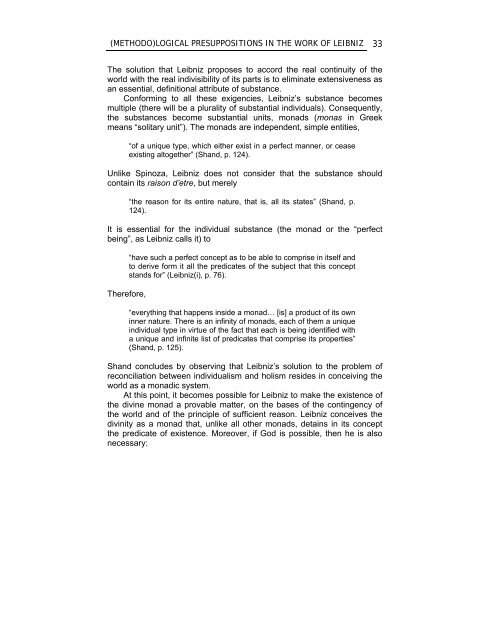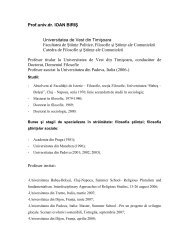analele universităţii de vest din timişoara annales universitatis ...
analele universităţii de vest din timişoara annales universitatis ...
analele universităţii de vest din timişoara annales universitatis ...
You also want an ePaper? Increase the reach of your titles
YUMPU automatically turns print PDFs into web optimized ePapers that Google loves.
(METHODO)LOGICAL PRESUPPOSITIONS IN THE WORK OF LEIBNIZ 33<br />
The solution that Leibniz proposes to accord the real continuity of the<br />
world with the real indivisibility of its parts is to eliminate extensiveness as<br />
an essential, <strong>de</strong>finitional attribute of substance.<br />
Conforming to all these exigencies, Leibniz’s substance becomes<br />
multiple (there will be a plurality of substantial individuals). Consequently,<br />
the substances become substantial units, monads (monas in Greek<br />
means “solitary unit”). The monads are in<strong>de</strong>pen<strong>de</strong>nt, simple entities,<br />
“of a unique type, which either exist in a perfect manner, or cease<br />
existing altogether” (Shand, p. 124).<br />
Unlike Spinoza, Leibniz does not consi<strong>de</strong>r that the substance should<br />
contain its raison d’etre, but merely<br />
“the reason for its entire nature, that is, all its states” (Shand, p.<br />
124).<br />
It is essential for the individual substance (the monad or the “perfect<br />
being”, as Leibniz calls it) to<br />
Therefore,<br />
“have such a perfect concept as to be able to comprise in itself and<br />
to <strong>de</strong>rive form it all the predicates of the subject that this concept<br />
stands for” (Leibniz(i), p. 76).<br />
“everything that happens insi<strong>de</strong> a monad… [is] a product of its own<br />
inner nature. There is an infinity of monads, each of them a unique<br />
individual type in virtue of the fact that each is being i<strong>de</strong>ntified with<br />
a unique and infinite list of predicates that comprise its properties”<br />
(Shand, p. 125).<br />
Shand conclu<strong>de</strong>s by observing that Leibniz’s solution to the problem of<br />
reconciliation between individualism and holism resi<strong>de</strong>s in conceiving the<br />
world as a monadic system.<br />
At this point, it becomes possible for Leibniz to make the existence of<br />
the divine monad a provable matter, on the bases of the contingency of<br />
the world and of the principle of sufficient reason. Leibniz conceives the<br />
divinity as a monad that, unlike all other monads, <strong>de</strong>tains in its concept<br />
the predicate of existence. Moreover, if God is possible, then he is also<br />
necessary:




